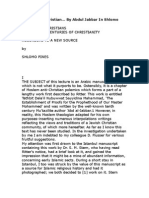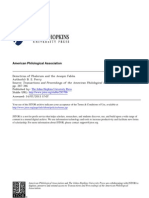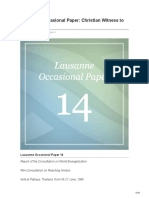Environment Conservation in Ancient India: DR Renu Tanwar
Environment Conservation in Ancient India: DR Renu Tanwar
Uploaded by
ShailuSreeCopyright:
Available Formats
Environment Conservation in Ancient India: DR Renu Tanwar
Environment Conservation in Ancient India: DR Renu Tanwar
Uploaded by
ShailuSreeOriginal Title
Copyright
Available Formats
Share this document
Did you find this document useful?
Is this content inappropriate?
Copyright:
Available Formats
Environment Conservation in Ancient India: DR Renu Tanwar
Environment Conservation in Ancient India: DR Renu Tanwar
Uploaded by
ShailuSreeCopyright:
Available Formats
IOSR Journal Of Humanities And Social Science (IOSR-JHSS)
Volume 21, Issue 9, Ver. 11 (Sep. 2016) PP 01-04
e-ISSN: 2279-0837, p-ISSN: 2279-0845.
www.iosrjournals.org
Environment Conservation In Ancient India
Dr Renu Tanwar
Assistant ProfessorDyal Singh CollegeKarnal
Introduction
In Modern Days Environmental Science And Ecology Is Subject Of Modern Science In Which We Study
Environment And Its Constituents. Environmental Degradation As A Phenomenon Can Also Be Defined As
Deterioration Of The Earths‟ Natural Surroundings, As A Result Of Excessive Exploitation Of The Available
Resources. The Natural World Has Been Totally Altered By The New And Improved Methods Of Production.
Present-Day Mankind Is Being Confronted By Serious Crises Due To The Depletion Of Natural Resources And
Environ-Mental Degradation Causing Great Damage To Human Sensibility, Man‟s Harmonious Relation-Ship
With Nature.
June 5, 2011 Was Decided To Be Celebrated As World Environment Day By The United Nations General
Assembly In 1972 And The Number Of Ngos And Private Agencies Working For The Cause Of Environment
Protection Has Been Increased Tremendously In India In The Last Two Decades. With All These Positive Signs
Of Awareness, This Paper Is An Effort To Examine Our Forgotten Culture Which Was Very Environment
Sensitive.
Ancient Literature Reveals A Full Knowledge Of The Undesirable Effects Of Environmental Degradation,
Whether Caused By Natural Factors Or Human Activities. Hindu Philosophy Has Always Been Very
Environment Friendly And They Were Very Sensitive About Environment. The Mahabharata, Ramayana,
Vedas, Upanishads, Bhagavad Gita And Puranas Be Full Of The Messages For Preservation Of Environment
And Ecological Balance.
Objectives
Our Ancient Literature Is Full Of Knowledge About All Aspects Of Life But Unfortunately Our Rich Ancient
Literature Has Forgotten By Our Young Generations. The Main Objective Of The Paper Is To Throw Some
Light On The Awareness Of Our Seers About The Environment.
Methodology
The Study Is Based On Secondary Data Which Have Been Collected From Various Books, Different National
And International Journals, Articles, Websites Etc
I. ANCIENT LITERATURE ON ENVIRONMENT CONSERVATION
Vedas, Upnishads And Puranas
Vedas Are Universally Accepted To Be The Most Precious Indian Heritage. The Vedas Have
Knowledge Of All Types And The Main Vedic Views Revolve Around The Concept Of Nature And Life.
Vedas Contained Several References On Environment Conservation, Ecological Balance, And Weather Cycle.
This Indicates The High Level Of Awareness Of The People At That Time.
In Ancient India, Protection And Cleaning Up Of Environment Was The Essence Of Vedic Culture In Hindu
Philosophy Forests, Trees And Wildlife Protection Held A Place Of Special Respect. Cutting Green Trees Was
Prohibited And Punishment Was Prescribed For Such Acts.
The Vedas Attach Great Importance To Environmental Protection And Purity. They Persist On
Safeguarding The Habitation, Proper Afforestation And Non-Pollution. In Fact, Man Is Forbidden From
Exploiting Nature. He Is Taught To Live In Harmony With Nature And Recognize That Divinity Prevails In All
Elements, Including Plants And Animals. The Rishis Of The Past Have Always Had A Great Respect For
Nature.
A Verse From Rig-Veda Says, “Thousands And Hundreds Of Years If You Want To Enjoy The Fruits
And Happiness Of Life Then Take Up Systematic Planting Of Trees.”
The Term Pollution Did Not Exist At That Time But They Call It Poisoning Of Environment. They Believe
That The Five Great Elements (Space, Air, Fire, Water And Earth) That Constitute The Environment Are All
Derived From Prakriti, The Primal Energy And Our Human Body Is Composed Of These And Related To
TheseFiveElements, And Connects Each Of The Elements To One Of The Five Senses. The Human Nose Is
Related To Earth, Tongue To Water, Eyes To Fire, Skin To Air And Ears To Space. This Bond Between Our
Senses And The Elements Is The Foundation Of Our Human Relationship With The Natural World. For
Hinduism, Nature And The Environment Are Not Outside Us. They Are An Inseparable Part Of Our Existence,
DOI: 10.9790/0837-2109110104 www.iosrjournals.org 1 | Page
Environment Conservation In Ancient India
And They Constitute Our Very Bodies. The Vedas Stress The Need For Protection And Development Of
Forests. Human Beings Have To Safeguard The Trees. The Vedas Emphasize That The Plants And Trees Are
The Treasures For Generations. It Is Amazing That The People In Vedic Times Regarded Nature And The
Environment In A Holistic Manner And Revered Each Of Its Constituents And Entities By Carefully Preserving
Them. "Do Not Harm The Environment; Do Not Harm The Water And The Flora; Earth Is My Mother, I Am
Her Son; May The Waters Remain Fresh, Do Not Harm The Waters”.“Do Not Cut Trees, Because They Remove
Pollution.” (Rig Veda, 6:48:17)“Do Not Disturb The Sky And Do Not Pollute The Atmosphere.” (Yajur Veda,5:43)
Besides Vedas, Upanishads, Puranas, Sutras And Other Sacred Texts Of Hinduism Contains A Number Of
References Of The Worship Of The Nature. Our Sanskrit Mantras Daily Remind Us That Our Rivers,
Mountains, Trees, Animals And The Earth Deserve Respect And Dignity. The Upanishads Are A Collection Of
Texts That Contain Some Of The Central Philosophical Concepts Of Hinduism, Some Of Which Are Shared
With Buddhism And Jainism.
Hinduism Recognizes That The Human Body Is Composed Of And Related To These Five Elements, And
Connects Each Of The Elements To One Of The Five Senses. The Human Nose Is Related To Earth, Tongue To
Water, Eyes To Fire, Skin To Air And Ears To Space. This Link Between Our Senses And The Elements Is The
Foundation Of Our Human Relationship With The Natural World. For Hinduism, Nature And The Environment
Are Not Outside Us. They Are An Inseparable Part Of Our Existence.
A Quote From Vishnu Purana States:
"As The Wide-Spreading Nargodha (Sanskrit For Banyan) Tree Is Compressed In A Small Seed,
So At The Time Of Dissolution, The Whole Universe Is Comprehended In Thee As Its Germ;
As The Nargodha Germinates From The Seed, And Becomes Just A Shoot And Then Rises Into Loftiness,
So The Created World Proceeds From Thee And Expands Into Magnitude."
The Varah Purana Says, ”One Who Plants One Peepal, One Neem, One Bar, Ten Flowering Plants Or Creepers,
Two Pomegranates, Two Oranges And Five Mangos, Does Not Go To Hell."
II. RAMAYAN, MAHABHARTA AND BHAGVAD GITA
The Hindu Religion Also Stresses Awareness In The Conservation Of Trees. In The Epic Ramayana Ravana,
When Faced With Calamity, Speaks As Follows:... I Have Not Cut Down Any Fig Tree In The Month Of
Vaisakh, Why Then Does This Calamity Befall Me? This Serves As A Good Example To Illustrate How
Hindus Respected Trees Which Constituted A Large Part Of Our Environment.In The Words Of The Ancient
Immemorial Indian Poet, Kalidasa:"The Himalaya Is A Great Devatatma, A Great Spiritual Presence, Stretching
From The West To The Eastern Sea Like A Measuring Rod To Gauge The World's Greatness."
The Mahabharata Hints That The Basic Elements Of Nature Constitute The Cosmic Being -- The Mountains His
Bones, The Earth His Flesh, The Sea His Blood, The Sky His Abdomen, The Air His Breath And Agni (Fire)
His Energy. The Whole Emphasis Of The Ancient Hindu Scriptures Is That Human Beings Cannot Separate
Themselves From Natural Surroundings And Earth Has The Same Relationship With Man As The Mother With
Her Child. Planting And Preservation Of Trees Are Made Sacred In Religious Functions
"The Purchaser Of Flesh Performs Himsa (Violence) By His Wealth; He Who Eats Flesh Does So By Enjoying
Its Taste; The Killer Does Himsa By Actually Tying And Killing The Animal. Thus, There Are Three Forms Of
Killing: He Who Brings Flesh Or Sends For It, He Who Cuts Off The Limbs Of An Animal, And He Who
Purchases, Sells Or Cooks Flesh And Eats It - All Of These Are To Be Considered Meat-Eaters.” -
The MahabharataBhagavad Gita , Contain Many References To The Omnipresence Of The Supreme Divinity,
Including Its Presence Throughout And Within Nature. In Sloka 20, Chapter 10, Lord Krishna Says,
"I Am The Self Seated In The Heart Of All Creatures. I Am The Beginning, The Middle And The Very End Of
All Beings". All Beings Have, Therefore To Be Treated Alike."
In The Bhagavad Gita, Krishna Compares The World To A Single Banyan Tree With Unlimited Branches In
Which All The Species Of Animals, Humans And Demigods Wander. Indian Consciousness Is Full Of Trees
And Forests. Various Trees, Fruits And Plants Have Special Significance In Hindu Ritual. Hindu Religious
Scripts, Stories, And Rituals Have Attempted To Drive Home The Importance Of Preserving Nature By
Deifying It Through The Centuries.Lord Krishna Says In The Bhagavad Gita (9.26):“Patram Pushpam Phalam
Toyam, Yo Mey Bhaktya Prayachchati Tadaham Bhakt Yupahrutam Asnaami Prayataatmanaha”
I Accept A Leaf, Flower, Fruit Or Water Or Whatever Is Offered With Devotion
The Coconut Tree And The Coconut Are Sacred And Are Offered To God During Worship. Mango Leaves Are
Used As Festoons During Pujas And Auspicious Events. All Flowers And Leaves Of Plants Are Used During
Worship For Pushpa Puja And Patra Puja. The Lotus Is A Sacred Flower And Plant For Hindus. The 'Tulsi'
Plant Or Indian Basil Is An Important Symbol In The Hindu Religious Tradition.
DOI: 10.9790/0837-2109110104 www.iosrjournals.org 2 | Page
Environment Conservation In Ancient India
III. KAUTILYA’S ARTHASHAST
Kautilya‟s Arthaśāstra, An Ancient Indian Treatise On Administration, Economic Policy, Taxation, Diplomacy,
Planning And Other Dimensions Of Statecraft, Remains Very Much Relevant In Today‟s World As Well. The
Text Was Influential Until The 12th Century, When It Disappeared. It Was Rediscovered In 1904 By R.
Shamasastry, Who Published It In 1909. The First English Translation Was Published In 1915.M
This Treatise Provides Lot Of Knowledge About Environment And Its Conservation. It Describes The
Maintenance Of Public Sanitation And Preservation Of Environment, Forest And Wildlife. Even In The Affairs
Of The State, The Administration And The Ruler Were Directed To Preserve And Promote Environmental
Welfare. In The Arthasastra, Kautilya Suggests The Need To Develop Abhayāranya Or Abhayavana, Forest
And Animal Sanctuaries, Where Trees And Animals Would Both Reside Free From The Fear Of Slaughter.
Kautilya Also Prescribed The Post Of A Forest Superintendent And Penalties For Poaching And Causing
Damage To Forests, Especially Productive Ones.
In Topic 35, The He Recommends That The "Superintendent Of Forest Produce" Appointed By The
State For Each Forest Zone Be Responsible For Maintaining The Health Of The Forest, Protecting Forests To
Assist Wildlife Such As Elephants (Hastivana), But Also Producing Forest Products To Satisfy Economic
Needs, Products Such As Teak, Palmyra, Mimosa, Sissu, Kauki, Sirisha, Catechu, Latifolia, Arjuna, Tilaka,
Tinisa, Sal, Robesta, Pinus, Somavalka, Dhava, Birch, Bamboo, Hemp, Balbaja (Used For Ropes), Munja,
Fodder, Firewood, Bulbous Roots And Fruits For Medicine, Flowers. The Arthashastra Also Reveals That The
Mauryas Designated Specific Forests To Protect Supplies Of Timber, As Well As Lions And Tigers, For Skins.
Kautilya Gives The Notion That New Forests Were To Be Planned, At The Time Of A New State Having
Been Established, On An Unoccupied Land And The Land Unsuitable For Agriculture
The Arthasastra‟s Directives On Water Indicate That It Was Regarded As A „Collective, Not A Private
Commodity‟ And Was Considered Extremely Precious. Fines Were Also Prescribed For A Number Of Acts
That Adversely Affected Water Bodies, „For Obstructing Or Diverting A Water Course‟, For „Damaging
Embankments‟ Etc.
He Emphasized On Efficient Water Management And The Detailed Instructions On How To Do It.
He Recommended Practices For The Conservation Of Natural Resources, Especially Living Resources. He Was
Aware That The Future Productivity Of Natural Resources Is Linked To Their Appropriate Conservation. Also,
In Line With Hindu Traditions, He Recommends Kindness Towards Animals.
Arthashastra Reveals The Attention Focused On Wildlife In The Mauryan Period: Certain Forests Were
Declared Protected And Called Abhayaranya Like The Present Day 'Sanctuary'. Heavy Penalties, Including
Capital Punishment, Were Prescribed For Offenders Who Entrapped, Killed Or Otherwise Molested Elephants,
Deer, Bison, Birds, Or Fish, Amongst Other Animals.
IV. TAGORE’S POEMS
In The Galaxy Of The Prophets Of Humanism Of The 20th Century, Rabindranath Tagore, The Novel
Laureate, Occupies A Frontal Position. He Churned Out Poems, Plays And Short Stories Emphasizing The Need
To Protect Nature. Human Interaction With Nature Was A Persistent Concern Of Rabindranath Tagore From
His Very Early Age.
Nature Runs As A Consistent Theme In All Of Rabindranath Tagore's Work. He Was An
Environmental Pioneer And Wanted Harmony Between Progress And Preservation. He Had Been Expressive
About The Exploitation Of Environment Even A Century Ago. Tagore First Became Concerned About Man's
Impact On The Environment After Seeing An Oil Spill At Sea On His Way To Japan In 1916, Decades Before
An Environmental Movement Emerged In The West.
Archana Bhattacharjee Analysed Tagore‟s Selected Nature Poems, Written A Century Back Viz. “The Tame
Bird Was In A Cage” And “I Plucked You Flower” In The Light Of The Above Theory To See What Kind Of
Message To Humanity They Carry Regarding Environmental Threats The World Is Facing Today.
In His Time Problems Like Water And Air Pollution, Problems Of Development Waste, Habitat Destruction,
Threats To Bio-Diversity, Resource Depletion And Global Green House Problems Were Not Properly
Understood And Recognised. Tagore With His Sensitive Farsighted-Ness Realised The Basic Links Between
Industria-Lism, Consumerism And Militarism And Properly Felt That The Success Of Growth Ulti-Mately
Would Lead To Its Own Demise.
He Wrote Poems, Plays, Short Stories And Also A Separate Group Of Lyrics In The Form Of Poems For Songs
Under The Name Of "Prakriti Parjaay" (Here, Prakriti Means Nature And Parjaay Means Genre), Emphasising
The Need To Protect Nature As Well As Our Mother Earth. Tagore Not Only Wrote Extensively On Man's
Relationship With The Environment But Implemented It Too By Building Santiniketan. It Is Surrounded By
Greenery On All Sides. He Created An Example For The Whole World In Terms Of The Relationship Between
Nature And Humans.
DOI: 10.9790/0837-2109110104 www.iosrjournals.org 3 | Page
Environment Conservation In Ancient India
V. CONCLUSIONS AND SUGGESTIONS
If We Look Back Into Our Ancient Literature, It Provides A Good Deal Of Knowledge About Each
And Every Aspect Of Life. We Have Rich Literature Inherited By Our Ancestors. In Case Of Environment
Conservation We Can Learn A Lot From Our Ancestors.
Dr. Abdul Kalam's Words: “Ancient India Was A Knowledge Society That Contributed A Great Deal To
Civilization. We Need To Recover The Status And Become A Knowledge Power. Spirituality Must Be
Integrated With Education. We Should Ignite Our Dormant Inner Energy And Let It Guide Our Lives. The
Radiance Of Such Minds Embarked On Constructive Endeavour Will Bring Peace, Prosperity, And Bliss To
The Nation.”
Our Ancestors Have Long Been Among The Most Outspoken Defenders Of Natures Balance. For The Hindu,
Nature Is Sacred, To Be Respected And Cared For. Thus We Can Say That Ancient Indians Were Very Much
Aware About The Ecology And Sustainability. It Helps In Solving Specific Environmental Problems And The
Modern Principles Of Sustainability Were Adopted At That Time. But Unfortunately We Have Forgotten Those
Golden Principles Which Can Be Very Helpful In Now Days.
To Have A Balanced, Peaceful Life, We Should Not Create Disturbances To Our Surroundings. We Should
Make Extensive Efforts In Planting Trees, Conserving Soil, Protecting Biological Diversity, And Finding New
Ways Of Producing Natural Energy Could Help To A Greater Extent In Maintaining A Balanced Environmental
Harmony In Our Present World.
REFERENCES
[1] Archana Bhattacharjee: Environmental Degradation;Issues And Concerns In Rabindernath Tagore‟s
Selected Poems, Galaxy;International Multidisciplinary Journal
[2] Atiur Rahman Tagore's Thoughts On Environment; Http://Www.Thedailystar.Net/
[3] Jayanta Kumar Ghosal :Rabindranath On Environment, Mainstream,Vol Liv No 20 New Delhi May 7
2016
[4] R.Vijyalakshami,Viewpoints: Environmental Awareness: The Hindu Perspective,Journal Of Hindu-
Christian Studies, Volume 6,Article 12,1993
[5] S.Kannan, Vedvikas, Online Repository Of Vedic Management, Vedic Science And Vedic Culture
[6] Https://Www.Scribd.Com/
[7] Http://Www.Hinduwisdom.Info/
[8] Https://Hindufocus.Wordpress.Com
DOI: 10.9790/0837-2109110104 www.iosrjournals.org 4 | Page
You might also like
- Ancient HistoryDocument50 pagesAncient HistoryItisha Jain50% (2)
- Kryia Yoga - Continuing The Lineage of EnlightenmentDocument5 pagesKryia Yoga - Continuing The Lineage of Enlightenmentscarbo1989100% (2)
- Environment Protection in Ancient ScripturesDocument14 pagesEnvironment Protection in Ancient ScripturesVibhuNo ratings yet
- Eco Aesthetics by RasheedDocument3 pagesEco Aesthetics by RasheedJulia CobbNo ratings yet
- Communication Skills and Soft SkillsDocument7 pagesCommunication Skills and Soft SkillsJANARDHANANo ratings yet
- Research Innovator: International Multidisciplinary Peer-Reviewed JournalDocument5 pagesResearch Innovator: International Multidisciplinary Peer-Reviewed JournalMehran AvNo ratings yet
- Diversities of Oral Epics Kalevala and Indian Oral EpicsDocument5 pagesDiversities of Oral Epics Kalevala and Indian Oral EpicsMahendra Kumar MishraNo ratings yet
- Banabhatta InfoDocument3 pagesBanabhatta InfoSatyam MohantyNo ratings yet
- Kavya-Alankara-Vivrti - Sreenivasarao's BlogsDocument10 pagesKavya-Alankara-Vivrti - Sreenivasarao's BlogsSovan ChakrabortyNo ratings yet
- Cinema & Ecology:: Landscapes in Malayalam New WaveDocument22 pagesCinema & Ecology:: Landscapes in Malayalam New Wavegirish chandranNo ratings yet
- A Study of Folklore Materials in The Novel Birgwsrini Thungri by Bidyasagar NarzaryDocument10 pagesA Study of Folklore Materials in The Novel Birgwsrini Thungri by Bidyasagar NarzaryIJAR JOURNALNo ratings yet
- Functional EngDocument4 pagesFunctional EngSafee UllahNo ratings yet
- Karnad Folk Strategies PDFDocument5 pagesKarnad Folk Strategies PDFshivaa111No ratings yet
- Aucitya in Poetry PDFDocument42 pagesAucitya in Poetry PDFjerryNo ratings yet
- Deep Ecology: L.Sri Lasya CB - EN.U4EEE15030Document19 pagesDeep Ecology: L.Sri Lasya CB - EN.U4EEE15030Meenakshi Saji100% (1)
- Mass Media As A Toxic MirrorDocument7 pagesMass Media As A Toxic MirrorrdmdelarosaNo ratings yet
- Effects of Sexual Advertising On Customer Buying DecisionsDocument7 pagesEffects of Sexual Advertising On Customer Buying DecisionsIOSRjournalNo ratings yet
- Abstracts - Objectionable AdvertisementDocument3 pagesAbstracts - Objectionable AdvertisementN.MUTHUKUMARANNo ratings yet
- Women in Advertising 111Document19 pagesWomen in Advertising 111Turkapally Yashwanth KumarNo ratings yet
- Chinthamani Journal of DR Suvarna Nalapat Trust August 2013Document26 pagesChinthamani Journal of DR Suvarna Nalapat Trust August 2013Suvarna NalapatNo ratings yet
- American Literary PeriodsDocument47 pagesAmerican Literary PeriodsAndreea ŢăranuNo ratings yet
- Hettinger Carson Environmental AestheticsDocument20 pagesHettinger Carson Environmental AestheticsKerol BomfimNo ratings yet
- Portrayal of Women in Indian Television PDFDocument376 pagesPortrayal of Women in Indian Television PDFParthesh Krishna RajwanshNo ratings yet
- Bhagavad Gita: The Paradox of Dharma and Its Ontology: Abilash Chandran RamchandranDocument15 pagesBhagavad Gita: The Paradox of Dharma and Its Ontology: Abilash Chandran RamchandranNiN SocietyNo ratings yet
- INDIAN KNOWLEDGE SYSTEMS 11 - Prof. Gopal Krishna ThakurDocument2 pagesINDIAN KNOWLEDGE SYSTEMS 11 - Prof. Gopal Krishna Thakurmanasneogi5100% (1)
- Representation of Women in Indian AdvertisementsDocument12 pagesRepresentation of Women in Indian AdvertisementsVanshali SanwalkaNo ratings yet
- EVS Syllabus 2nd SemDocument2 pagesEVS Syllabus 2nd SemabemmakhencyNo ratings yet
- The Double Standards of PatriarchyDocument16 pagesThe Double Standards of PatriarchyNanda ArumugamNo ratings yet
- Advaita - G. MishraDocument11 pagesAdvaita - G. MishraBruhath Kotamraju100% (1)
- BhojaDocument3 pagesBhojaJoesmowNo ratings yet
- Samsung PCIEDocument4 pagesSamsung PCIEUmesh TiwariNo ratings yet
- Objectification of WomenDocument68 pagesObjectification of WomenShanzay AliNo ratings yet
- Basavanna ChinmaySurpurDocument2 pagesBasavanna ChinmaySurpurMahesh100% (1)
- Humans Vs Nature 2Document6 pagesHumans Vs Nature 2api-510252942100% (1)
- Natya SastraDocument19 pagesNatya Sastraishika biswasNo ratings yet
- Environment, Ecology and EcocriticismDocument7 pagesEnvironment, Ecology and EcocriticismJuNo ratings yet
- Pramod K. Nayar - Writing Wrongs - The Cultural Construction of Human Rights in India-Routledge India (2012)Document197 pagesPramod K. Nayar - Writing Wrongs - The Cultural Construction of Human Rights in India-Routledge India (2012)Shweta SinghNo ratings yet
- Plant Diversity in The Valmiki RamayanaDocument73 pagesPlant Diversity in The Valmiki RamayanaJitendra SinghNo ratings yet
- Translating The Millennium - Indian Literature in The Global MarketDocument15 pagesTranslating The Millennium - Indian Literature in The Global MarketParulNo ratings yet
- DRAUPADI AND THE DECONSTRUCTION OF GENDER BINARIES by DR - Deepa Verma PaperDocument8 pagesDRAUPADI AND THE DECONSTRUCTION OF GENDER BINARIES by DR - Deepa Verma PaperDr. Bijender SinghNo ratings yet
- Review of Rajbali Pandey's Hindu Samskaras: Socio-Religious Study of The Hindu SacramentsDocument2 pagesReview of Rajbali Pandey's Hindu Samskaras: Socio-Religious Study of The Hindu Sacramentsrhapsodysinger100% (1)
- Indian Theory of TranslationDocument11 pagesIndian Theory of TranslationManoj Sankaranarayana100% (1)
- A HISTORY OF INDIAN ENGLISH DRAMA - Sunoasis Writers Network PDFDocument10 pagesA HISTORY OF INDIAN ENGLISH DRAMA - Sunoasis Writers Network PDFSovan ChakrabortyNo ratings yet
- Aesthetics, Gender, and Canon in Anti-Caste Graphic Narratives, A Gardener in The Wasteland and BhimayanaDocument18 pagesAesthetics, Gender, and Canon in Anti-Caste Graphic Narratives, A Gardener in The Wasteland and BhimayanaJoyashree DeyNo ratings yet
- The Dalit in Tamil Literature - Past and PresentDocument17 pagesThe Dalit in Tamil Literature - Past and Presentdebanjanghoshal88No ratings yet
- 21B.Riddles in Hinduism PART II PDFDocument71 pages21B.Riddles in Hinduism PART II PDFVeeramani ManiNo ratings yet
- Ratnabali Chatterjee - Prostitution in Nineteenth Century Bengal - Construction of Class and GenderDocument15 pagesRatnabali Chatterjee - Prostitution in Nineteenth Century Bengal - Construction of Class and GenderAnkan KaziNo ratings yet
- Sharma, Chinmay (2017) Many Mahabharatas: Linking Mythic Re-Tellings in Contemporary India. PHD Thesis. Soas, University of LondonDocument385 pagesSharma, Chinmay (2017) Many Mahabharatas: Linking Mythic Re-Tellings in Contemporary India. PHD Thesis. Soas, University of LondonvenkatgurijalaNo ratings yet
- Kerala Culture Translation 16Document20 pagesKerala Culture Translation 16SONUNo ratings yet
- SynopsisDocument15 pagesSynopsisGodhuli BhattacharyyaNo ratings yet
- Foundation Course Project: Name: - Krishna Singh Class: - SYBMS A' Roll No.: - 6049 Topic: - Indian Mtyhs and RealityDocument17 pagesFoundation Course Project: Name: - Krishna Singh Class: - SYBMS A' Roll No.: - 6049 Topic: - Indian Mtyhs and RealityKrishna SinghNo ratings yet
- Remaking The Indian Historians CraftDocument9 pagesRemaking The Indian Historians CraftChandan BasuNo ratings yet
- Reflections On RamanujanDocument19 pagesReflections On RamanujanAjit Yadav100% (1)
- Gift in Green Conecting Fiction To RealityDocument19 pagesGift in Green Conecting Fiction To Realityjay krishnan100% (1)
- Kuvalayamala 2Document14 pagesKuvalayamala 2Priyanka MokkapatiNo ratings yet
- Deep EcologyDocument25 pagesDeep EcologyMohit YadavNo ratings yet
- DR K M Munshi Ji The Great Visionary and An Architect of Modern IndiaDocument16 pagesDR K M Munshi Ji The Great Visionary and An Architect of Modern Indiagk mNo ratings yet
- ECOLOGISMDocument12 pagesECOLOGISManon_290180994No ratings yet
- Plants Chapter 2Document37 pagesPlants Chapter 2RonitSingNo ratings yet
- The Indians and Indiannessin Chetan Bhagat's Five Point SomeoneDocument6 pagesThe Indians and Indiannessin Chetan Bhagat's Five Point SomeoneAnonymous CwJeBCAXpNo ratings yet
- Hinduism: Information Provided byDocument13 pagesHinduism: Information Provided byShailuSreeNo ratings yet
- KKT List 2 2020 PDFDocument8 pagesKKT List 2 2020 PDFShailuSreeNo ratings yet
- Sustainable Concepts of Traditional Sanskrittheatre The Harippad Subrahmanya Swami Temple, AlleppyDocument7 pagesSustainable Concepts of Traditional Sanskrittheatre The Harippad Subrahmanya Swami Temple, AlleppyShailuSreeNo ratings yet
- Environmental Imperatives For A Pilgrimage Event - Case Study Orchha, IndiaDocument10 pagesEnvironmental Imperatives For A Pilgrimage Event - Case Study Orchha, IndiaShailuSreeNo ratings yet
- Floral Waste Utilization-A Review: Aakanksha MahindrakarDocument5 pagesFloral Waste Utilization-A Review: Aakanksha MahindrakarShailuSreeNo ratings yet
- 3 Impact Assessment MethodologyDocument9 pages3 Impact Assessment MethodologyShailuSreeNo ratings yet
- Environmental Ethics The Indian Contribu PDFDocument18 pagesEnvironmental Ethics The Indian Contribu PDFShailuSreeNo ratings yet
- Searching For Comparative International Water Research: Urban and Rural Water Conservation Research in India and The United StatesDocument21 pagesSearching For Comparative International Water Research: Urban and Rural Water Conservation Research in India and The United StatesShailuSreeNo ratings yet
- Characterization of Tenth Century Ancient Building Materials of Seenakesavaperumal Temple, Yelagiri Village, Tamil NaduDocument5 pagesCharacterization of Tenth Century Ancient Building Materials of Seenakesavaperumal Temple, Yelagiri Village, Tamil NaduShailuSreeNo ratings yet
- Searching For Comparative International Water Research: Urban and Rural Water Conservation Research in India and The United StatesDocument21 pagesSearching For Comparative International Water Research: Urban and Rural Water Conservation Research in India and The United StatesShailuSreeNo ratings yet
- Sunlighting and Daylighting Strategies I PDFDocument16 pagesSunlighting and Daylighting Strategies I PDFShailuSreeNo ratings yet
- Environmental Status Assessment of Guruvayur Temple Precincts in Kerala, IndiaDocument9 pagesEnvironmental Status Assessment of Guruvayur Temple Precincts in Kerala, IndiaShailuSreeNo ratings yet
- Section 3 Green Urban Areas - CopenhagenDocument9 pagesSection 3 Green Urban Areas - CopenhagenShailuSreeNo ratings yet
- 220720160Q87RZKYAnnexure-EIA EMPReportDocument86 pages220720160Q87RZKYAnnexure-EIA EMPReportShailuSreeNo ratings yet
- Major Parks of GHMCDocument1 pageMajor Parks of GHMCShailuSreeNo ratings yet
- Solar Architecture in Cyprus PDFDocument325 pagesSolar Architecture in Cyprus PDFnikita chawlaNo ratings yet
- ART20178830Document3 pagesART20178830ShailuSreeNo ratings yet
- The Influence of Heat Transfer and Stora PDFDocument6 pagesThe Influence of Heat Transfer and Stora PDFShailuSreeNo ratings yet
- Das 15 - City Profl HyderabadDocument11 pagesDas 15 - City Profl HyderabadShailuSree100% (1)
- Hyderabad's Water Blues: Lakes, Rivers Fall Prey To UrbanisationDocument27 pagesHyderabad's Water Blues: Lakes, Rivers Fall Prey To UrbanisationShailuSreeNo ratings yet
- Final PCB Report FinalDocument30 pagesFinal PCB Report FinalShailuSreeNo ratings yet
- Thermal Characteristics of A Vernacular PDFDocument8 pagesThermal Characteristics of A Vernacular PDFShailuSreeNo ratings yet
- Envelope Thermal Design Optimization For PDFDocument32 pagesEnvelope Thermal Design Optimization For PDFShailuSreeNo ratings yet
- 10th Century Syriac GospelDocument93 pages10th Century Syriac GospelYeshua Abdul Mu'min100% (1)
- New Cantor Chosen: Spring - June 2009Document20 pagesNew Cantor Chosen: Spring - June 2009Temple Beth SholomNo ratings yet
- The Satanic Bible WikipediaDocument73 pagesThe Satanic Bible WikipediaDanaditya PratamaNo ratings yet
- By Name Kasus Aktif PR 2022Document706 pagesBy Name Kasus Aktif PR 2022Andriani KairunizaNo ratings yet
- Our Courage in Danger, by Harvey C. MansfieldDocument8 pagesOur Courage in Danger, by Harvey C. MansfieldHoover Institution100% (2)
- 13.al RaadDocument5 pages13.al RaadFahadAhmadShahNo ratings yet
- International Organisations-IO and Counter TerrorismDocument22 pagesInternational Organisations-IO and Counter TerrorismMirza BeganovićNo ratings yet
- PDFDocument61 pagesPDFdumezil3729100% (1)
- Dar Al Mustafa CurriculumDocument12 pagesDar Al Mustafa CurriculumOwais Akbani100% (1)
- Book of Vile Darkness Spells 3.5: V, S, M, DemDocument2 pagesBook of Vile Darkness Spells 3.5: V, S, M, DemThisIsMy DeadDropNo ratings yet
- The Saturn TheoryDocument13 pagesThe Saturn TheoryBZ Riger100% (4)
- G.K. Chesterton - Outline of SanityDocument125 pagesG.K. Chesterton - Outline of SanitykeruiroNo ratings yet
- Analytical School of LawDocument19 pagesAnalytical School of LawAnklesh08100% (3)
- C.O.C Hymn BookDocument228 pagesC.O.C Hymn BookcarolmkwendaNo ratings yet
- Pola Pendidikan Dan Pola Dakwah Islamic Centre Mu'Adz Bin Jabal (Icm) Di Kota KendariDocument23 pagesPola Pendidikan Dan Pola Dakwah Islamic Centre Mu'Adz Bin Jabal (Icm) Di Kota KendariGala JatiNo ratings yet
- Lausanne Occasional Paper Christian Witness To HindusDocument42 pagesLausanne Occasional Paper Christian Witness To HindusJohnson HsuNo ratings yet
- A Sketch of The Life of Nanamoli TheraDocument83 pagesA Sketch of The Life of Nanamoli TheradhammadocsNo ratings yet
- Okamoto Takashi Trans Thomas P Barrett IDocument18 pagesOkamoto Takashi Trans Thomas P Barrett Izhongdalu1998No ratings yet
- Eastern and Western Perspective of The Self PDFDocument16 pagesEastern and Western Perspective of The Self PDFPrince AntivolaNo ratings yet
- Han DynastyDocument33 pagesHan DynastyyypokpNo ratings yet
- BCS Course RegulationsDocument8 pagesBCS Course Regulationsjairaj321No ratings yet
- Screenshot 2023-03-31 at 12.37.31 PMDocument1 pageScreenshot 2023-03-31 at 12.37.31 PMxypnsgjyytNo ratings yet
- Sephardic Music Within The Culture of Bosnian JewsDocument25 pagesSephardic Music Within The Culture of Bosnian JewsDjsoogee Sudzuka MNo ratings yet
- Dominus IesusDocument31 pagesDominus IesusBenj EspirituNo ratings yet
- Chophy - Christianity and Tribal India-2021Document480 pagesChophy - Christianity and Tribal India-2021Neeraj MishraNo ratings yet
- Tragic Flaw in Hawthorne'S "The Birthmark" 1Document5 pagesTragic Flaw in Hawthorne'S "The Birthmark" 1alejas_p93100% (1)
- - Reff -: Hu Xia-Na Xie Nian (胡夏-那些年)Document16 pages- Reff -: Hu Xia-Na Xie Nian (胡夏-那些年)Ian QrNo ratings yet
- Byzantine Iconography of The Nativity of The Virgin Mary in The Light of A Homily of St. John DamasceneDocument27 pagesByzantine Iconography of The Nativity of The Virgin Mary in The Light of A Homily of St. John DamascenelimpdeliciousNo ratings yet















































































































